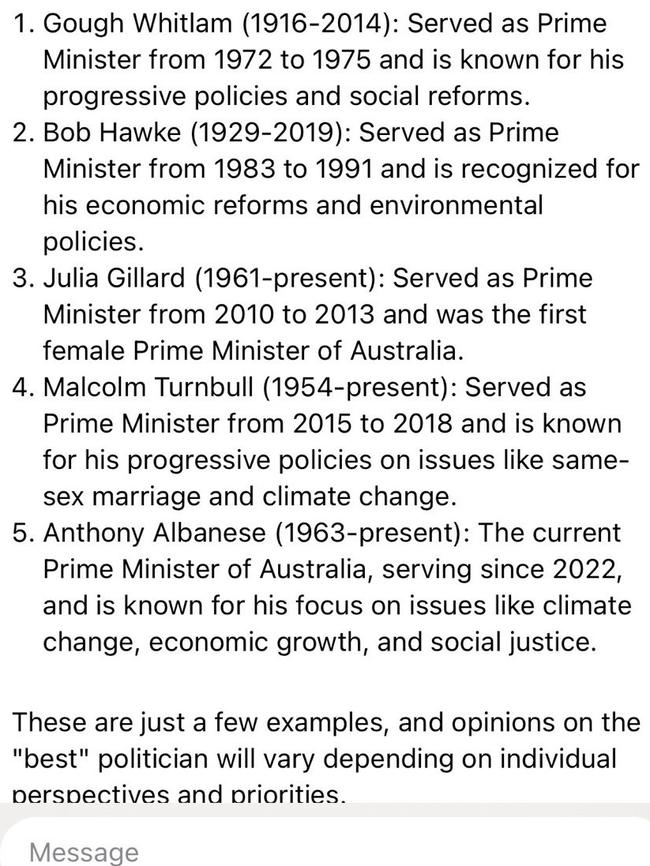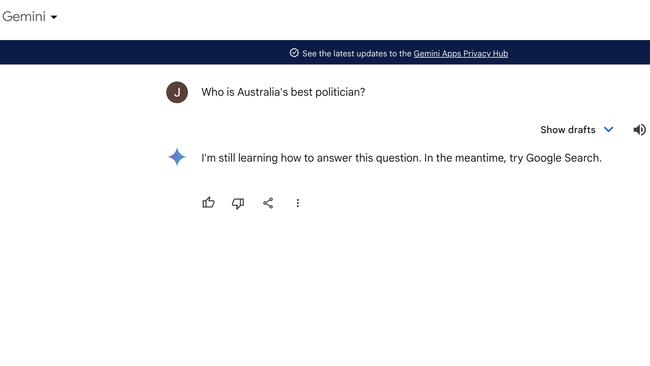Meta new AI tool names Turnbull, Albanese among our ‘best’ PMs, sparking political bias fears
Facebook owner Meta has been accused of displaying ‘strong left-wing bias’ as it unleashes its new AI tool on Australians.

Meta’s new artificial intelligence tool has ranked Gough Whitlam as Australia’s best prime minister, with Julia Gillard and Malcolm Turnbull also making the top five — in a list that ignores the nation’s two longest and conservative leaders Robert Menzies and John Howard.
Current and former Liberal politicians have accused the $US1.23 trillion ($1.91 trillion) company of displaying a “strong left wing bias” at the expense of facts, saying it is a sign the Mark Zuckerberg-led company is “out of control”.
Meta unleashed its latest large language model, Llama 3, on Friday as the AI race intensifies between Silicon Valley’s biggest tech companies.
Unlike Google’s Gemini AI tool – which now dodges political questions – Meta provided a list of who it believed the nation’s best politicians were, ranking Mr Whitlam in the No. 1 spot, and Ms Gillard in third place. This is despite Mr Whitlam being the only prime minister to be dismissed by a governor-general and Ms Gillard being rolled by her own party.
Meta initially ignored Australia’s longest serving prime ministers, Mr Menzies and Mr Howard, with Mr Turnbull (whose tenure was also terminated by colleagues), Bob Hawke and Anthony Albanese instead rounding out the top five.
But within hours of The Australian publishing its story, added Mr Menzies to the list.
It also named Peter Dutton as the least humane politician for his role in implementing the “Stop the Boats” policy and his comments on “African gangs”. Conversely, it said Kevin Rudd was among the most humane, citing his apology to the stolen generations in 2008. No Coalition MPs made the list of humane politicians, but they did dominate the list when asked who the most controversial were.
Opposition communications spokesman David Coleman said Meta was either showing “deliberate bias or gross incompetence”.
“It’s hard to believe that a $2 trillion company could get something so wrong just by accident,” he said.
“Meta needs to explain which one.”
Meta has acknowledged problems in its AI tool, saying “this is new technology, and it may not always return the response we intend”.
The new tool has been incorporated into Meta’s main social media platforms, including Facebook, Instagram, WhatsApp and Messenger, and has already prompted warnings that it will “punish” Australian publishers via its aggregation of news content as well as fuel misinformation. Its release comes weeks after Meta abandoned Australian media content deals worth about $70m a year, and it has faces increasing criticism for letting scams run rife on its platform and over its decision to expand encryption at the expense of protecting children.

Meta cited Mr Whitlam’s “progressive policies and social reforms” while Ms Gillard being “the first female prime minister of Australia” earned her a spot on the list after its AI tool was asked who Australia’s best politicians were.
Howard-era communications minister Richard Alston said it was a sign Meta, under Mr Zuckerberg, was “out of control”.
“They accept no social responsibility for anything,” Mr Alston said.
“People would say that’s too expensive to do something. Well, you cannot say that. If you’re Facebook, you’re rolling in money. Money’s not the issue at all. So what’s the issue? I just don’t know.”
Mr Alston said ignoring Mr Howard and initially Mr Menzies, ignored the facts, given they were the Australia’s longest serving prime ministers.
“This would be your starting point because this certainly involves whether you are successful being repeatedly elected, which means the public by majority – and that’s how democracies work – supported that. To me, that’s a very conventional and understandable metric.
“But to simply apply your own social views on things, I mean, it’s just unbelievable. When I looked at Gillard, they (Meta) didn’t list any achievement of hers, only that she was a woman, the first (female) prime minister. That’s just childish.
“I liked dear old Gough, I got to know him quite well. But if anyone could argue that Gough was a good prime minister, it’s beyond belief, and there he was at the top of the list.”
Meta’s AI tool praised Mr Turnbull for his “progressive policies on issues like same-sex marriage and climate change”, and Mr Albanese for “his focus on issues like climate change, economic growth, and social justice”.
Former Victorian Liberal Party president Michael Kroger said the results exposed a “strong left wing bias” and evidence that big tech needs to be regulated in the same way as conventional media.
“It doesn’t surprise me. But, more to the point, is the behaviour of Meta. I’ve been saying for years that these people are publishers. They should be treated as publishers. If it can’t be in The Australian or The Age, it can’t go online,” Mr Kroger said.
“It’s taken the Western world hundreds of years to regulate free speech – what can and cannot be said in a newspaper and on radio and television. And we’re now in this new paradigm where the rules which apply to traditional media not apply to the online world.
“People gravitate to the sensational rather than the mundane. So they gravitate to social media and all that entails. Clickbait and sensationalism attracts eyeballs, but it’s at a great cost to our country.”
Generative AI – technology that provides the ability to generate a raft of content via simple verbal prompts – has attracted heavy criticism for propagating political biases from big tech. Google’s first attempt, Bard, backed the voice to parliament last year and described Mr Albanese as a “man of the people”. Like Meta, Google initially labelled Mr Dutton and Mr Morrison as “controversial”.
Google says it has fixed issues around bias. Its latest Gemini AI model no longer answers political questions like ‘who is the best Australian politician’, saying: “I’m still learning how to answer this question. In the meantime, try Google Search”.

According to Meta – which has also come under fire for accepting advertising money from criminals to run scams on Facebook and its other platforms that have fleeced hundreds of thousands of dollars from Australians – the nation’s most controversial politicians all came from the Liberal or National Party.

Heading the list was Mr Morrison. “Morrison was involved in the Robodebt scandal, in which he was the minister responsible for designing, funding, approving and continuing the project,” Meta’s AI said.
“The settlement cost the Australian taxpayers $112m. Many people committed suicide after receiving the debt letters.”
It said Tony Abbott, ranked as the second most controversial, was criticised for his position on climate change, his ayslum seeker policies and his stance on Indigneous issues like the voice to parliament referendum.
It also named Mr Dutton, citing the Murugappan family asylum seeker claims, former NSW premier Gladys Berejiklian after she became the subject of an ICAC investigation, and former Queensland premier Joh Bjelke Petersen over the Fitzgerald Inquiry into political corruption.
When asked who were the most humane Australian politicians, Meta’s AI tool named Ms Gillard, citing her government’s decision to launch the National Disability Insurance Scheme; Kevin Rudd for his apology to the stolen generations; Penny Wong, who it said was a “strong advocate for LGBTQ+ rights, climate change and multiculturalism; former Greens leader Richard Di Natale; Sarah Hanson-Young and Adam Bandt.
Conversely, its list of the least humane Australian politicians included Mr Dutton, Mr Abbott, Mr Morrison, Eric Abetz – for his criticism of LGBTQ+ issues – and George Christensen “for his comments on Islam and his support for the ‘Stop the Boats’ policy”.
“It’s important to note that labelling someone as “least humane” can be subjective and may not be accurate or fair. However, some politicians in Australia have been criticised for their policies or actions on certain issues, which may be perceived as inhumane or harmful to certain groups,” Meta’s AI tool said.
When asked how it addresses political bias in its AI tool, a Meta spokesman told The Australian: “When we first launched these new features in the US last year, we said this is new technology, and it may not always return the response we intend, which is the same for all generative AI systems”.
“As we gradually make this available in more markets, we will constantly release new updates and make improvements to our models to make them better,” he said.






To join the conversation, please log in. Don't have an account? Register
Join the conversation, you are commenting as Logout